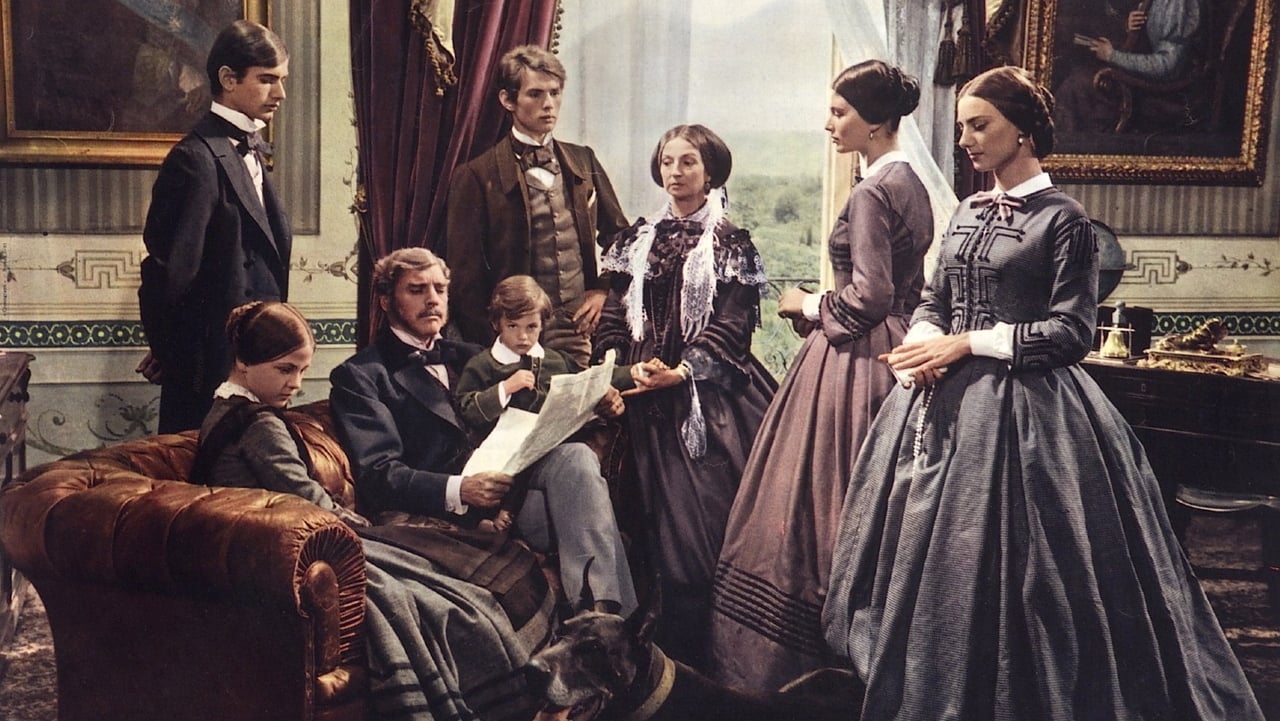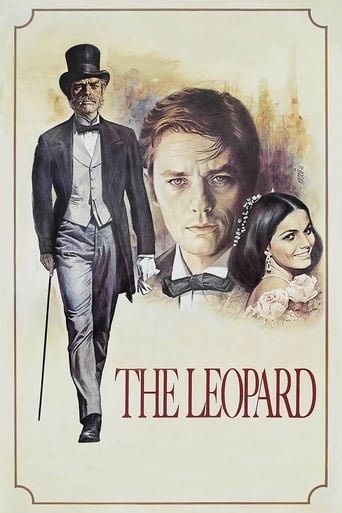

I've been on IMDb for over 10 years and I've never written a review before, but this time I was so disappointed with this film that I needed to write something. The Leopard is a film that's universally praised, even the great Martin Scorsese hails it as an essential piece, so I expected a solid masterpiece, but that wasn't the case here. I'm a big fan of Death in Venice and Rocco and His Brothers (both directed by Visconti), I usually enjoy long period films and I'm not really concerned when "nothing happens" in a film, but that's because when a film doesn't have a clear plot, it usually involves some serious character development or images that tell a story, even if it's not linear; unfortunately this film gets lost in itself, not really knowing what it wants to be, it's incredibly uneven, the political aspect that provides the context seems rather superficial even if the dialogue is mostly about politics and in the end it doesn't commit to anything, we get the main character who is the only one who seems like a real human being and not a one-dimensional statue, and Lancaster does a very good job with what he's given, but he becomes a spectator to the central couple that could not be more bland and uninteresting, they're supposed to be young and full of life but they seem to be uncapable of any real emotion (and Alain Delon is usually a great actor) and there's no way the audience could actually care about them. The production design, cinematography, costumes and music are indeed remarkable, I don't know how the book tells the story because I haven't read it, but even if it's a faithful adaptation, there should have been some sort of work in character development, pacing and finding a central line, because even in a film that's simply about "a few moments in the life of a family" there should be a theme that's fully explored, and yes, Don Fabrizio has an arc, seeing he's no longer relevant in the world but that would've worked if the people around him actually felt like real people. At last I'd also like to mention that the dubbing IS a problem, a lot of people say that it shouldn't take you out of the story but isn't a truly great film in the sound era supposed to have audio correctly synced? That's actually a problem for most (if not all) Italian films from the 60s (including La Dolce Vita, and 8 1/2) and I just can't ignore it because it is ultimately a flaw. So overall, I would never call this a terrible film or even a truly bad one, but I would say it is ineffective, flawed and definitely not a masterpiece.
... View MoreFilm Review: "Il gattopardo" (1963)Fighting through competition as "Harakiri" directed by Masaki Kobayashi (1916-1996) and "To Kill A Mocking Bird" directed by Robert Mulligan (1925-2008) at Cannes Film Festival 1963 in its 16th edition, the ultra-lavish production value-indulging "Il gattopardo" directed by exceptional Italian director in visual and emotional transcendence Luchino Visconti (1906-1976) marks his masterpiece on international cinema with Hollywood leading actor Burt Lancaster (1913-1994) as Don Fabrizio Salina, the main character fighting insulting change in aristocratic societies with proletarian revolutionaries as the character of Tancredi Falconeri and Mario Girotti, portrayed by Alain Delon and Terence Hill respectively, when the eternal-feminine-sharing actress Claudia Cardinale as character of Angelica Sedara, at age 27, tribute to Guiseppe di Tomasi di Lampedua's novel from 1958 gives director Visconti the oppportunity to shine by finding balance in ultimate cinemascope visuals and sound to score by legendary composer Nino Rota (1911-1979) galvanizes a perfect picture on the fading existence of any generation, who stays for too long inmoveable in power of the way of life for the entire world to breathtaking quotes by the leading man, performed by match-making Lancaster: "It has to change everything in order to let everything stay as it is," before walking off into dark allies in night exteriors of mingling aristocrats with the organized proletariat."The Leopard" strikes further high notes with Academy-Award-nominated Costume Design by Piero Tosi, who favors Luchino Visconti's directorial vision, when this motion picture for the ages finds cinematic peaks in a 40-Minutes-ball scene in opera-splendid reception, where the inevitable change in 1860s Sicily, Italy becomes unstoppable with a smiling and whipping eye of life-exposing tragic proportions that any spectator take the time to witness this 180-Minutes-Film winning then without a doubt the "Palme d'Or" in its first international festival exhibition that becomes impeccable to deny by any audience that a human's life'S structures of security fade, where every individual on the planet strives from, getting here jeopardized over a single night of extravaganza. Copyright 2018 Cinemajsty Entertainments LLC
... View MoreThis known novel is magnificently brought to the screen with colorful images , impressive soundtrack , visually absorbing cinematography and sensitive as well as thoughtful events . An epic story dealing with Fabrizio Cordero , the Prince of Salina , the Leopard (Burt Lancaster , though 20th Century Fox asked Visconti to choose from among Anthony Quinn, Spencer Tracy and Lancaster ; Luchino wanted Laurence Olivier for the title role and he wanted to cast Nikolai Cherkasov , too). Salina is an upright aristocrat who attempts coming to terms with the new rulers of Sicily as well as overcome his family and class amid the troublesome social upheavals . Fabrizio observes the waning of his noble home and attempts to help build a new Sicily but his nephew Tancredi (Alain Delon , though Horst Buchholz turned down the role) , Prince of Falconeri (Alain Delon) assures his status by marrying Don Calogero Sedara's (Paolo Stoppa) gorgeous daughter Angelica (Claudia Cardinale) .Luchino Visconti's enduring romantic adventure deals with the tumultuous social upheavals of 1860's Sicily , and it is paced in slow and deliberate rhythm . The film traces the rising and falling of Fabrizio Corbero , Prince of Salina and the corresponding rise to eminence of the hugely wealthy ex-peasant Don Calogero . However , the film results to be overlong , it seems longer than its 187 minutes running time . Based on the classic novel written by Giuseppe Tomasi di Lampedusa , being scripted by Suso Cecchi D'Amico , Pasquale Festa Campanile and considered to be the best screen adaptation ever . Such was Luchino Visconti's attention to detail that it was shot in actual historical palaces , including authentic pictures , objects and tools . Concluding the climatic scene in the sumptuous forty-minute ball and long banquet where Tancredi introduces Angelica to society , it is deemed to be one of the greatest set pieces in film history . Originally released in USA in a badly dubbed 165 minutes version , picture was restored in 1983 to proper form .Masterful interpretation by the great Burt Lancaster , The Prince of Salina , a noble aristocrat of impeccable integrity who tries to preserve his family against their dark destination and nice acting by Alain Delon as his ambitious nephew who swims with the tide and assures his own position . Support cast is pretty well , they give top-notch performances such as Paolo Stoppa , Romolo Valli , Terence Hill , Pierre Clémenti , Giuliano Gemma and Ida Galli . Colorful and evocative cinematography in Technirama wide screen system, by Giuseppe Rotunno . Classical and emotive score by Nino Rota . The motion picture was masterfully directed by Luchino Visconti and was shot over 11 of the hottest weeks of the year , being Martin Scorsese's favorite movie .This celebrated story was well based on historical deeds , these were the followings : Sicily was invaded by "A corps of volunteers led by Giuseppe Garibaldi landed in Sicily in order to conquer the Kingdom of the Two Sicilies, ruled by the Bourbons" . The Expedition of the Thousand was an event of the Italian Risorgimento that took place in 1860. A corps of volunteers led by Giuseppe Garibaldi landed in Sicily in order to conquer the Kingdom of the Two Sicilies, ruled by the Bourbons. The project was an ambitious and risky venture aiming to conquer, with a thousand men, a kingdom with a larger regular army and a more powerful navy. The expedition was a success and concluded with a plebiscite that brought Naples and Sicily into the Kingdom of Sardinia, the last territorial conquest before the creation of the Kingdom of Italy on 17 March 1861.The sea venture was the only desired action that was jointly decided by the "four fathers of the nation" Giuseppe Mazzini, Giuseppe Garibaldi, Victor Emmanuel II, and Camillo Cavour, pursuing divergent goals. It is difficult to determine the true instigator: Mazzini desired to release the Mezzogiorno and Rome, whereas Garibaldi wanted to conquer in the name of Victor Emmanuel II, the Kingdom of the Two Sicilies and continue to Rome to complete the unity of Italy, and Cavour wanted to avoid at all costs conflict with his French ally, Napoleon III, who protected Rome.The expedition also brings new large collective ambiguity and misunderstanding: for Garibaldi, it is to achieve a united Italy; to the Sicilian bourgeoisie, an independent Sicily as part of the kingdom of Italy, and for the mass farmers, the end of oppression and land distribution
... View MoreSeriously, what spoiler could I possibly write if not a single thing happens in this condemned 3 hours long colossal bore? Oh, pardon me ladies and gentlemen, I meant in this work of art. Sure, I'm not an intellectualoid, and I don't want to pretend I am by giving a 10 to this film in a website either. I just go out, read books, watch TV and been in a museum so, unfortunately, I already knew how aristocrats and rich people lives and behaves before watching this film, and I've also seen big houses, paintings, nice costumes, people smoking cigars, and dancing at a ball before!!! It seems like some reviewers never heard of those things and discovered them all of a sudden from a 1963 movie. Well, good for you, but I wanted a film with a plot, a soul, some depth to fill the nice wrapper for 185 MINUTES (20 would have been more than enough), not just this "moving paintings" that has put me to sleep from the first minute. If you have sleep problems I strongly recommend you to watch this film, is the best cure you'll possibly find in the entire world. Lancaster, Delon, Cardinale.. what a waste of actors and tape. User richieburt has made the perfect review of this, and I agree with it 100 percent. If you're really interested, watch this movie just to learn how rich and boring people lived and still lives. But don't wait for a plot, or an interesting love triangle. You'll have the disappointment of your life. Here's the progression:Minutes 0 to 4: Opening credits.Minutes 4 to 10: People praying the same prayer over and over.Minutes 10 to 25: A man leaving a house.Minute 25.....another Mass... a dinner... never-ending ball....zzzzzzzzzzzzzzzzzzzzzzzzzzzzzzzz.
... View More